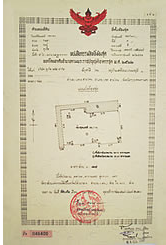
Apartment buildings
and condominium license
Only multi unit apartment buildings licensed under the condominium act B.E. 2522 and registered with the land department as 'condominium' offer freehold ownership of the apartment units and government issued ownership unit title deeds (image on the right). Private apartment projects (not having obtained a condominium license) do not offer ownership nor individual unit title deeds but only possession of the units under private (lease) contract structures.
True condos and holiday apartments
A condominium is in section 4 of the condo act defined as a building where persons are able to hold personal ownership of the apartment units (sections) and joint ownership in common areas. The difference with a private multi unit apartment building is the form of ownership. Licensed condos under condo laws have multiple owners who each have individual ownership of the units and proportional joint ownership and management and control of the common areas. A private apartment building has one single owner and ownership title that encompasses the property as a whole. The principle right of control and management of the property lies with one owner and not the individuals who obtain possession of the apartment units.
As opposed to licensed condos the nature and essentials of private apartment structures are:
- ownership of a unit is not legally separated from the building as a whole and there are no individual unit ownership title deeds (there is no individual ownership nor joint ownership of the building or the common areas of the project),
- possession of the units is usually based on a tenancy contract as lease of a specific part of the building (foreigners do not have to qualify for lease registration under a special law and there is no foreign lease quota but any long term lease must be registered with the land department),
- the principle right of management and control of the common areas lies with the owner of the building (the occupants of the building are basically tenants of the units and have to comply with the terms of use of the common areas as agreed with the owner (and pay associated management and maintenance fees)),
- the lease agreement often include separate long term maintenance and management contracts of the common areas and facilities of the complex (these contract structures could go either way, pro lessee or pro lessor/ developer/ owner and could put a considerable financial burden on the occupants). The terms and conditions under which possession of the unit is obtained should be carefully checked because once signed you are committed and the contracts cannot be altered without the consent of the other party.
Related:
